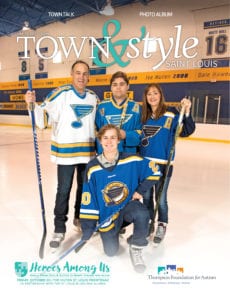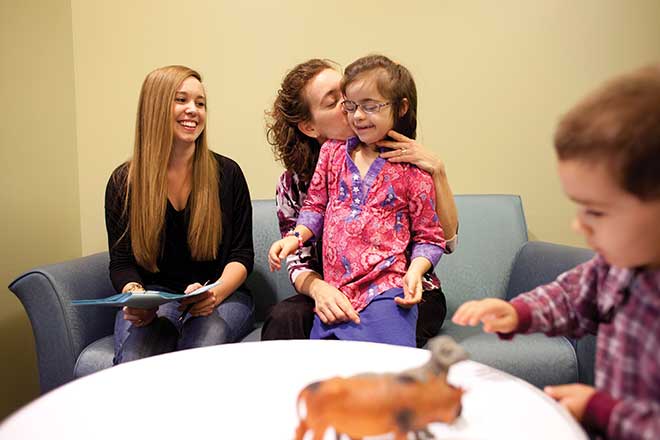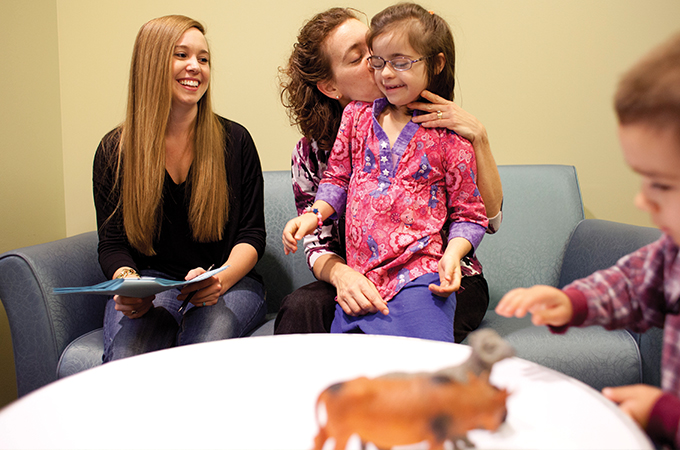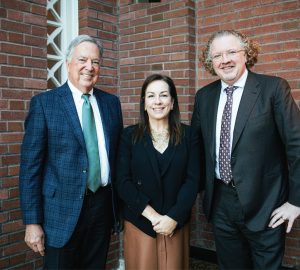It’s ‘blitz week’ at Thompson Center for Autism & Neurodevelopmental Disorders. That means—in the space of four days—the center will evaluate as many children as possible. “It’s crazy here,” says executive director Stephen Kanne, Ph.D., describing the hive of activity as staff and providers evaluate dozens of youngsters at its University of Missouri facility in Columbia. “We see kids and answer parents’ questions as fast as we can,” he says. “We work through lunch, and everyone pitches in—university faculty, cognitive testing technicians, front desk staff, insurance specialists … ” He stresses, however, that no child is short-changed, that all children receive an expert assessment by the institution, considered a national leader in autism spectrum disorder (ASD) care, research and legislative efforts.
Kanne says that only 65 percent of the kids the center evaluates end up being diagnosed with ASD. “Even though it can sound like there’s an autism epidemic, there isn’t,” he says. “But we are better at identifying the condition when it’s present and, therefore, are able to get kids the right treatment earlier.” ASD—commonly thought to be a genetic disorder—presents as difficulties with communication and social interaction, and in repetitive behaviors or restricted interests. According to the Centers for Disease Control, autism affects 1 in 68 children in the U.S.
Early diagnosis and treatment are key to helping those with autism lead successful lives, but that kind of care can be costly. That’s where the Thompson Foundation comes in. Founded in 2007 by Bill and Nancy Thompson, it’s the center’s fundraising arm, supporting projects, programs and financial aid that make a difference in the lives of families affected by ASD. Since its founding, the nonprofit has raised $4.7 million through its annual gala in St. Louis, the organization’s principal fundraiser.
 “[The center] is an amazing place,” says Jack Reis, the foundation’s regional director for philanthropy. “Since its founding just 12 years ago, it has risen to become one of the top institutions in the country.” Reis cites the sheer number of patient visits—12,000 annually—and the overall standard of care. “No one does the research or provides the level of clinical care and training that Thompson Center does,” he says. “It’s a behemoth, an epicenter for autism care in the Midwest.”
“[The center] is an amazing place,” says Jack Reis, the foundation’s regional director for philanthropy. “Since its founding just 12 years ago, it has risen to become one of the top institutions in the country.” Reis cites the sheer number of patient visits—12,000 annually—and the overall standard of care. “No one does the research or provides the level of clinical care and training that Thompson Center does,” he says. “It’s a behemoth, an epicenter for autism care in the Midwest.”
And it continues to grow: In September, a new research and training building is set to open next door, and this, Kanne says, will free up space in the existing building for more clinics. In addition, a new video conferencing tool called ECHO Autism will help Thompson Center specialists extend their reach into rural communities that otherwise might go unserved.
Kanne stresses that none of this would be possible without the foundation’s support. “If it weren’t for the gala, we’d have to close our doors,” he says. This year, the event’s theme is ‘Heroes Among Us,’ and the St. Louis Blues partners with the foundation to host the gala. Honorary chairs are former NHL All-Star Scott Mellanby and wife Sue, whose son, Carter, has autism. The gala takes place Oct. 20 at the Hilton St. Louis Frontenac. “It’s an exciting event,” Reis says. “Four-hundred guests will assemble to support individuals and families. We are blessed to have their support.”
Pictured: A mom and her child receive services at Thompson Center.
Photo courtesy of Thompson Foundation
Founded in 2007, the Thompson Foundation is the fundraising arm that supports Thompson Center for Autism & Neurodevelopmental Disorders at University of Missouri. ‘Heroes Among Us,’ the 11th annual auction, takes place Oct. 20 at Hilton St. Louis Frontenac. Pictured on the cover: Clockwise from center front, Nick, Scott, Carter and Sue Mellanby. For more information, call Jack Reis at 314.550.2888 or visit heroesamongusstl.info.
Cover photo by Tim Parker Photography










